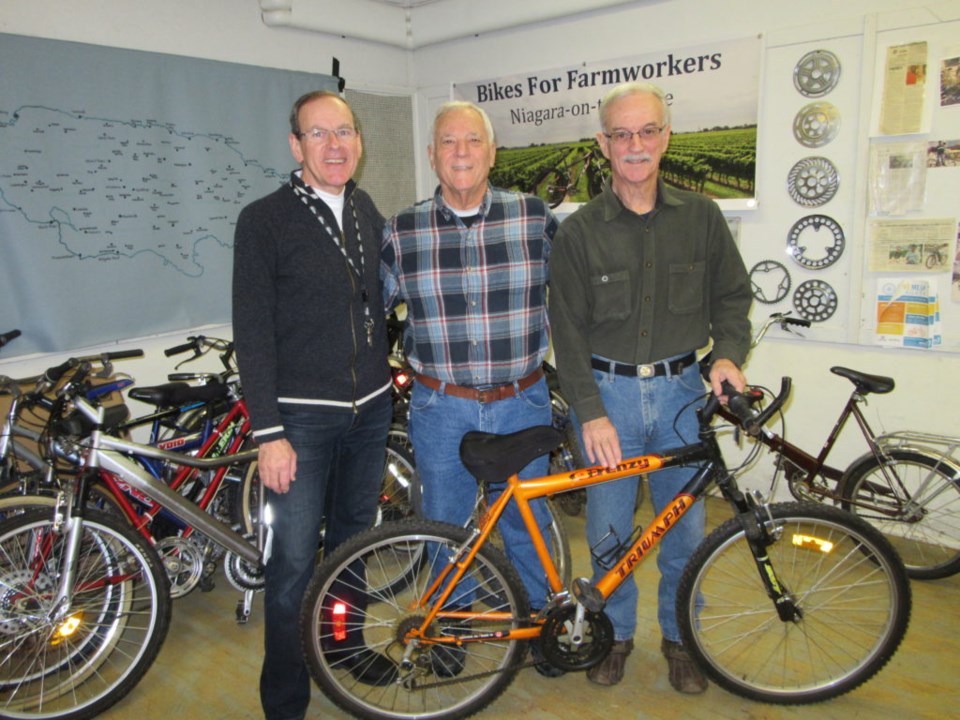
Volunteers are signed up and prepared to repair bikes for farmworkers when they return next spring.
All that’s needed now is more bikes.
Bicycles for Farmworkers, a local organization gearing up to expand the operation, held two public meetings recently to attract more volunteers.
The goal was accomplished, with seven new volunteers, some already adept at bike repairs, says Mark Gaudet, who with his friend Terry Weiner set out in 2016 to rebuild bikes for the hard-working men and women who come to Niagara-on-the-Lake during the farming season.
They come to Niagara and other agricultural communities across Canada through a federal program established in 1966 to provide much-needed labour for local growers. Thousands of workers come from the Caribbean and Mexico, and spend long hours on the farms where they are employed, depending on bicycles so they can buy groceries, do errands and socialize with workers on other farms.
There are also health, safety and social events organized by several groups, including the Canadian Outreach Workers Project, which was established more than 50 years ago. And bicycles are key to providing transportation so farmworkers can attend.
Attention on the farmworkers, focusing on their safety and their role as members of our community, has been growing in recent years, thanks to these organizations and individuals who volunteer in many different capacities.
But there is still work to be done, made evident by two tragic events this summer — one a fire at a greenhouse operation that wiped out many of the labourers’ possessions and sent them home before the end of the season, and in Niagara-on-the-Lake, the death of a Mexican woman, who was struck by a truck in a hit-and-run while she was walking after dark on Concession 7.
Gaudet and Weiner, determined to amp up their efforts to have enough safe bicycles in working order for the workers when they return in the spring, have added another work station in the basement of the former Virgil Public School, their headquarters. They have about a dozen volunteers now, says Gaudet, some still requiring some training, and seven workstations. Although they can slow down over the winter, they will keep working, and it won’t take them long to get through the 100 bikes they have on hand now.
“If there are people cleaning out their garages now, maybe thinking they’d like to get their cars in this winter, they might come across some adult bikes they want to get rid of. We’d be happy to take them,” says Gaudet.
This year has already been a busy one for the volunteers, says Gaudet, with 549 bikes refurbished and sold for a nominal price, and more than 380 farmworker-owned bikes repaired.
In 2016, their first year working together on Bicycles for Farmworkers, the men rebuilt a modest 40 bikes which were either donated to farmworkers through a raffle at a local health fair, or sold at a small cost. Weiner, retired from a career as an aerospace engineering consultant and with some experience restoring old cars, knew how to fix a bike. Gaudet, who had worked in management for a company that sold paper, had to learn from his friend, he says. Their second year, they repaired many more bikes donated from a generous community, with the help of a handful of volunteers who came on board— 270 were refurbished, and another 168 repaired. The two men had started out paying for supplies out of their own pockets, but gradually donations from the community helped to make their organization self-sustaining. Gaudet says.
They have discovered that while some of the workers ship their bikes home when they leave for the season, the majority leave them here, knowing they will return.
“Bikes are labelled with the year the group sold them,” says Gaudet, “and we’ve had several come back for repairs with 2017 labels.”
Gaudet and Weiner have spoken to groups interested in setting up similar programs in other Ontario farming communities, providing them with everything they could possibly need to know about creating their own sustainable operations.
They have had communities as far away as Dunnville bring them bikes, which they repair and return to be distributed in that community.
They have provided logistical support, training and supplies to Bike Me Up, a not-for -profit in St. Catharines, that is providing affordable transportation to semi-homeless, vulnerable people, says Gaudet.
One very positive development this year that they will continue is the installation of USB rechargeable lights on both the front and back of bikes.
Gaudet says they get the lights at cost, and then, thanks to donations, sell them at half of that price. They see many bikes with battery-operated lights, the batteries of which are long dead and useless. The batteries are expensive and not usually replaced, says Gaudet, so they’d rather pay a little more for the lights and know they will last.
As word is spread further afield about their program, they have developed partnerships locally and across the region, Gaudet say, including bicycle touring businesses which help them with the supplies they need.
Anything donated that they can’t use is given away and sold for scrap by one of the churches to fund programs for farmworkers.
If you have a bike that is rideable or repairable, that you’re not using and would like to see put to good use, contact Weiner at 905-321-8638 or Gaudet at 289-783-1684.